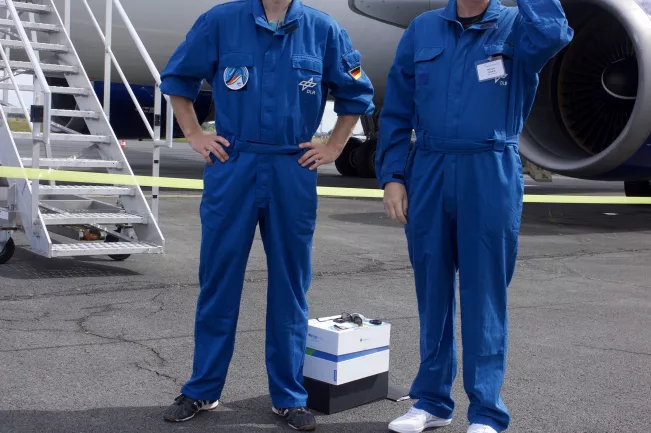Communications and Marketing
University experiments in zero gravity

In collaboration with Canadian colleagues, scientists of H-BRS are now investigating the effects of weightlessness on human perception. In the past, astronauts repeatedly reported that the perception of their own movements and the estimation of distances changed considerably in weightless space. This makes collisions with vehicles or other moving objects more likely and poses an additional source of danger for man and machine. In order to develop measures to combat this disorientation, H-BRS scientists, in cooperation with researchers from the York Centre for Vision Research (CVR) and the German Aerospace Center (DLR), are conducting experiments in microgravity. When gravity is almost completely suspended, the SMUG experiment (self-motion under gravity) in parabolic flight is intended to investigate the influence of gravity on one's own motion and to help optimise training methods for astronauts.
In order to simulate the conditions in space, the scientists led by Professor Dr Rainer Herpers of H-BRS are taking part in scientific parabolic flights organised by DLR's Space Agency. During parabolic flights, gravity is temporarily suspended by controlled dive flights. In these phases, the test persons involved complete a series of visual tests that are compared with the results of the same series of tests on Earth. If differences are detected, the scientists can use the data to determine the extent to which self-perception is influenced by weightlessness. The first flight took place in September.
SMUG is related to the long-term microgravity project VECTION. It is funded by the Canadian Space Agency CSA and is part of the Human Research Program of the American Space Agency NASA, which investigates the risks of altered perception in space missions. The practical phase of VECTION runs until 2023 on the International Space Station (ISS) and will be complemented by the results of the SMUG study.
Relevance for geriatric medicine
In addition to the benefits for space travel, the scientists also hope to gain new insights for medicine. Previous observations suggest that the symptoms of age-related perception disorders are similar to the effects of space sickness caused by weightlessness. The test results could thus help to better understand, for example, the disorientation of sick patients and improve medical treatment.
Sie haben noch Fragen?

Rainer Herpers
Scientific Director of the Graduate Institute, Professor for Computer Vision, Computer Graphics, Multimedia Applications , Director of the Institute for Visual Computing, Director of the Department of Informatics and Data Science at PK NRW
Research fields
Location
Sankt Augustin
Room
F 427
Address
Grantham-Allee 20
53757, Sankt Augustin
Telephone
+49 2241 865 217Location
Sankt Augustin
Room
C 275
Address
Grantham-Allee 20
53757, Sankt Augustin
Telephone
+49 2241 865 217
[Archive] Eva Tritschler
Press and Public Relations, Spokeswoman/Editor-in-Chief of the university magazine doppelpunkt:
Location
Sankt Augustin
Address
Grantham-Allee 20
53757 Sankt Augustin